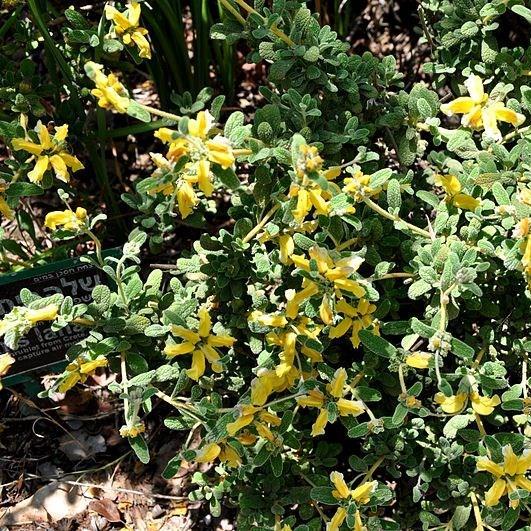
Phlomis fruticosa
Jerusalem Sage
This is a perennial evergreen mid height shrub with ovate aromatic grey green leaves with furry undersides. Hooded yellow flowers appear in whorls that are attractive to bees.
Contributed by @justin
-
Full sun to partial shade
-
Very little water
-
Frost Hardy: 23F (-5°C)
-
Light and free draining
Common name
Jerusalem Sage
Latin name
Phlomis fruticosa
type
Evergreen Shrub
family
Lamiaceae
ph
5.5 - 8.0 Acid - Neutral
Plant & bloom calendar
-
Best time to plant
-
When the plant will bloom
full grown dimensions
 1.50 M
1.50 M
1.50 M
1.50 M
Phlomis fruticosa
This is a perennial evergreen mid height shrub with ovate aromatic grey green leaves with furry undersides. Hooded yellow flowers appear in whorls that are attractive to bees.
Summer flowering
From Early Summer TO Late Summer
Yellow clusters of hooded flowers up to 3cm appear in whorls towards the upper leaf axis.
Propagating by division
From Late Spring TO Early Summer
The vigour of the plant can be maintained by dividing the plant every 2 - 3 years. Divide the root-ball by inserting two garden forks, back-to-back, into the root-ball, and then prising them apart. Re-plant the two new root-balls
Propagating by cuttings
From Mid Spring TO Early Summer
Take softwood cuttings from new growth early in the day in Spring or early Summer. Cut, neatly, a 4" approx. piece of a non-flowering shoot, pinch out the tip, and cut off the bottom leaves. Dip the bottom of the cutting in hormone rooting powder, and carefully place in a pot of cutting compost with the leaves just above the level of the compost. Water, label, cover with a polythene bag, and place in a warm, bright place, out of direct sunlight. Take the polythene bag off periodically for a while for ventilation (at least twice a week)
Planting
From Early Spring TO Late Spring
Plant Jerusalem sage in Spring in light, infertile soil, in a sunny, or partially shaded, site. If planting more than one plant, plant them 60 cms. apart.



























